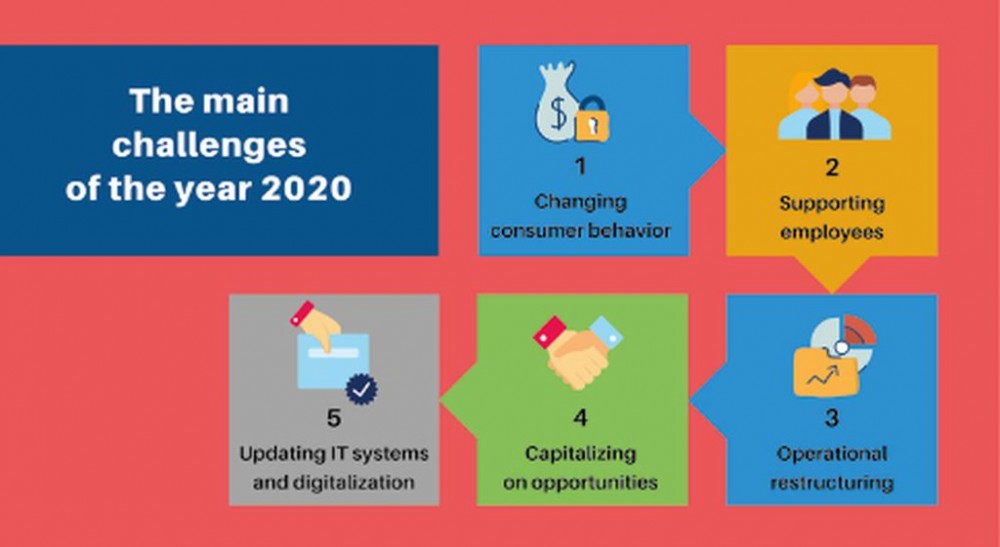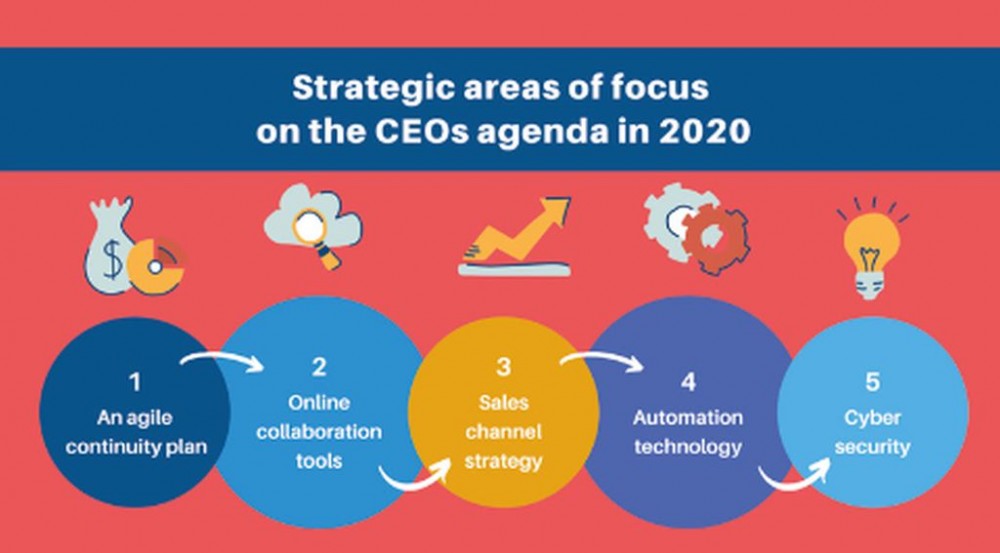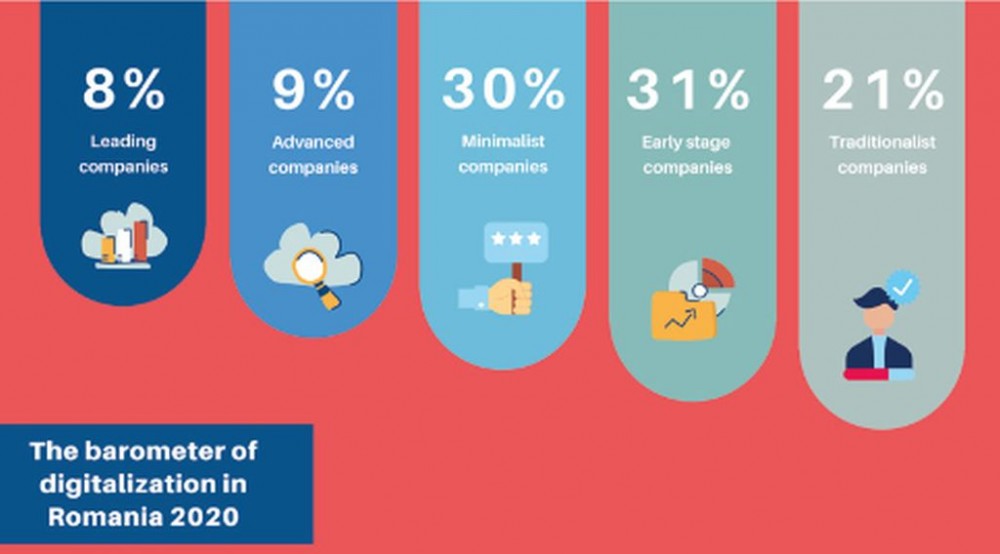THIS IS THE YEAR THAT WILL GO DOWN IN HISTORY AS THE YEAR THAT CHANGED EVERYTHING
Whether it is the way of dealing with a raging pandemic, the way of doing business or the way of living a life confined by sanitary rules, everything turned upside down at the beginning of 2020, and then to continue like a mad ride in a planetary rollercoaster.
In 2020, companies have been forced to adapt quickly to the new operating reality. Instantly everything has moved or shifted to the online environment and people have discovered the merits and tensions of remote working or remote education. Beyond the decline in demand and the inability to have business meetings, the “gifts” of this crisis have been: the widespread adoption of remote working, the refining of the digital tools utilization, and the recognition of the value of digital transformation and information technology by employees.When everything goes upside-down, it is important to have as many reliable sources of information as possible. Most of these come from inside the company, from the Financial, Operations, HR, Acquisitions, and many other departments. To complete these data and information flow, Valoria and Doingbusiness.ro have conducted a series of surveys on the Romanian business outlook in the first half and the second half of the year but also on the digitalization of Romanian companies. These surveys offer a valuable reference at the overall level and, most importantly at the industry sector level.
The pandemic has drawn the attention of many companies to the value of information technology and digital transformation. In this new business and social environment, several action areas have focused the attention of the CEOs, executive directors, and top managers, as follows:
An agile continuity plan – Even with a continuity plan in place, company leaders have had a difficult time to cope with the impact of the crisis. Therefore, an agile business continuity plan ready to be implemented immediately, especially after activating the work from the home system, has been the most appropriate solution. The new business environment characterized by volatility, uncertainty, complexity, and ambiguity has required quick answers, and most of the time remote working as a long-term solution has proven appropriate.
Online collaboration tools – Companies had to identify, evaluate, and put in place a mix of online collaboration tools relevant to their business, to work remotely. Besides the companies that offer premium solutions at high prices, there are also companies that can offer similar tools and solutions at affordable prices. The most important aspects are the security and scalability of the solution for remote collaboration, in any access option.
Sales channel strategy – Because buying behaviors have been seriously affected by the isolation and social distancing, companies that had operated mainly in the offline environment could no longer afford to see online only as an option but as a necessity. Integrating an online presence into the daily operations has meant a clear strategy and a certain investment to ensure greater business sustainability.
Automation technology – Most production companies, when they have not completely closed their production, have reduced it considerably. Additionally, the pressure on the supply chain as increased due to the fractures in the international transportation. In a world where people working together on a production floor brings sanitary risks, automating production companies must become reality to ensure a better way to cope with future health crises.
Cyber security – Securing all company data and sensitive information has become an obligation dictated not necessarily by the GDPR directive, but by the security of the business itself. The remote work brings additional challenges from this point of view. The explosive use of tools or platforms for remote work may expose companies to security risks that might have not been considered in the product design phase. Complementary to the above come the latest technologies, such as: RPA, Artificial Intelligence, and Machine Learning, Virtual Reality, 3D Printing also more or less directly relevant to companies depending on the industry. But the key to digital transformation is not just technology, but collaboration. At the intersection of technology and people is the solution to the digital transformation of companies. For companies that have not made efforts for the digital transformation in recent years, COVID-19 will likely be the catalyst to push this transformation beyond the finish line. Companies that have not invested in people and their training have been forced to change their employment and investment policy. In this exceptional context, in 2020 the mission of decision makers has been increasingly complicated by the multitude of challenges, as follows:
Changing consumer behavior– Once they have overcome the initial shock of the virus, business decision-makers had to consider the impact of pandemic changes on how they communicate, build, and guide the experiences consumers now need and want. Companies could accelerate their pivoting towards digital commerce, by expanding their offerings and creating new service lines to provide contactless delivery services and personal pick-up services. This acceleration has been forcing companies to imagine their digital strategies to capture new market opportunities and new customer segments.
Supporting employees – All companies have looked at how they work. Many companies are still facing the transformations brought about by the remote work required to protect their employees. Providing services to customers in the new context and ensuring business continuity are a priority. The experience of managers in developing agile consumer and workforce strategies is essential to maintaining the viability of companies and helping people and their families survive financially now and in the future.
Operational restructuring – The pandemic emphasized the need for leaders to accelerate the adoption of agile ways of working and transforming the value chain to help overcome uncertainty. The transition from top-down decision making to team empowerment, data-driven, and cloud-enabled for faster market speeds shows the adoption of agile ways of working. Rigid structures have been replaced and modular organizations are being created that connect and activate quickly. The smart company is capable of dynamic self-management and continuous adaptation. It is built for agility, resilience, and growth.

Capitalizing on opportunities – Leaders have needed to balance risks while assessing the growth opportunities arising from the crisis. The current and future viability of companies depends on the rapid action of decision makers, including short-term actions for stability and strategic moves that will create new growth contexts. To cope with short-term cash flow challenges, costs, and profitability, or with financing investments in new opportunities, action must be immediate. Many decision makers have faced declining sales and rising costs. Adaptation does require investment in key technologies, processes, and people.
Updating IT systems – As companies experience these new challenges, leaders have had to act quickly to address the urgent resilience issues of IT systems, and to lay the foundations of a relevant technological infrastructure for the future. The following actions have been privileged by many companies:
1. Digitized workforce: With an emphasis on remote work, collaborative tools, mobile solutions, etc.
2. Automation: Working with large volumes of tasks, optimizing staff utilization.
3. Cloud-based solutions: Traffic management for IT infrastructure, native solutions.
Consumer demand patterns are changing, supply chains are disrupted and under pressure, markets and companies are responding differently to the COVID-19 crisis. As pointed out by the experts of Doingbusiness.ro, companies need to accelerate and become resilient and agile. During a crisis, leaders must remain objective and rational. This is often easier said than done, especially when important decisions are being made with limited resources. The ability to see beyond the challenges of uncertainty and volatility is essential because leaders need to find the path that will lead the team and the company forward. In this complex business environment, digital transformation has become a priority for companies small or big. Thus, the Barometer of digitalization in the Romanian companies 2020, the survey conducted by the consulting company Valoria in partnership with Doingbusiness.ro, becomes a valuable reference for top executives.
The study reveals the five categories of maturity in terms of digitalization of Romanian companies, as follows:
1. Traditionalist companies – Have inadequate technologies that lead to limited use of digital data. Compared to the 2018 edition of the study when there were 23% such companies, in 2020 there are 21%.
2. Early stage companies – Have started to implement digital technologies and / or develop a strategy for digital transformation. Compared to the 2018 edition of the study when there were 37% such companies, in 2020 there are 31%.
3. Minimalist companies – Have created an adequate technological infrastructure, have a strategic direction for digital transformation, and have implemented some digital solutions. Compared to the 2018 edition of the study when there were 24% such companies, in 2020 there are 30%.
4. Advanced companies – Have adequate technological infrastructure, a digital transformation strategy and digital technologies for the entire company. Compared to the 2018 edition of the study when there were 9% such companies, in 2020 there are 10%.

5. Leading companies – Have integrated digital technologies throughout the company and have achieved substantial improvements following the digital transformation. Compared to the 2018 edition of the study when there were 7% such companies, in 2020 there are 8%.The research also shows that there are two categories of factors that influence the digitalization of companies. The internal factors are represented mainly by the exchange of generations both at the staff level but especially at the management level and the more diverse external factors. Regarding the external factors, we find that for 39% of the companies worldwide and 37% of the Romanian companies the new business models determine the digitalization of the companies and that for 45% of the companies worldwide and 34% for those in Romania the new technologies determine also the digitization of companies. The barometer further reveals that the digitization of competitors determines the digitalization of companies for 39% of companies worldwide compared to 42% for those in Romania. Romanian companies are more careful to ensure their competitive level. Customer expectations are an external factor that determines the digitalization of companies for 43% of companies worldwide and 29% of companies in Romania. The difference explains the better focus of companies worldwide on customers compared to those in Romania. Also, the disruptive competitors from other industries are an external factor that determines the digitalization for 25% of companies worldwide and 17% for those in Romania. Romanian companies are digitalizing because their competitors are doing the same, but they are not paying attention to the potential of the solutions adopted by disruptive competitors in other industries. They have the reflexes of thought and action given by the patterns of their industry. And, finally, the pressure from partners and suppliers is an external factor that determines the digitalization for 19% of companies worldwide and 12% for companies in Romania.The year 2020 is a massive example of how technology changes the way we live, work, learn, communicate, and connect. There is a new way now of creating jobs, redefining social standards, and producing new dynamics in the work culture and practices. In the virtual-first world, the competition is increasingly being won by organizations that offer flexible work options, personalized career plans, and a greater scope for the company’s mission. In this context, the new formula of success is technological evolution, continuous learning, personal and organizational transformation. The lessons of the year 2020 are yet to be learned by many companies and public institutions. Stay in touch with the information that makes all the difference on Valoria.ro and Doingbusiness.ro. The year 2021 is going to be a bumpy ride too!
About Valoria
Valoria Business Solutions is a consulting, training, and coaching company. The mission of the company is to transform the potential of teams and organizations into value. Competence, trust, innovation and passion are the values we uphold through everything we do. We believe in people and their aspiration for personal and professional fulfillment and their desire to accelerate their potential. Find out more about us at: www.valoria.ro.

You can read the article also in the document below:


































